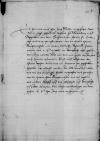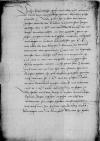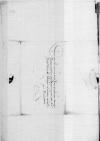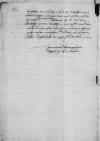Den ersamen und namhafftigen herren ⌊burgirmeistern und rathmannen der koniglichen stadt Dantzke⌋, / unsern besondern, gunstigen freundenn.
Unsern freuntlichen grus und alles gutes zuvoran. Ersame und namhafftige herren, / besondere, guthe freunde. /
Wir haben hie unsern besondernn, guthen freundt, / den erbarn, ersamen hern ⌊Jorgen Moller⌋ / von Ewer Erbarkeit mit dem glaubsbrieff, / den wir dorzu unnottig achten, / an uns geschickt, / gerne gesehen, / angenommen / und gehort, / auch sein wolgestelt anbrengen in sonderer freuntlicheit gen Ewer Erbarkeit mit vleis bei uns bewogen. / Was wir im dorauff vortrauter weis geantwort, (: weil wir im argwahn etlicher leut, welcher uff uns mit ungrunde gefast, / und in dem wir derhalben unangesprochen, hessig angeben werden, / nicht gerne sein :) doneben auch, was wir vor das beste den zweien herrenn ⌊burgermeistern⌋ zu gut unserm gneigten gemuet nach, / das wir zu Ewer Erbarkeit und der guthen ⌊stadt⌋, unserm vaterlandt, tragen, / bedacht und erkennen, / wirt er Ewer Erbarkeit unser wolmeynung anzeigen etc. Wir haben auch das jenige, / so unsern unmundigen ohemen ⌊Jorgen Scholtzen⌋ angehet, / wie sich das widderpart zur sachen schicken, / eingenommenn, / uns auch mit im hirinne weitleufftig beredt, / derwegen wir dis koniglich mandat hie haben beigelegt, / dornach sich Ewer Erbarkeit / der billigkeit unnd freuntlicheit nach / gen uns / wol werden wissen zurichten, / bittende Ewer Erbarkeit, die wir gotlichen gnaden bevelhenn, / uns widderumb dorauff mit den ersten, was zum antwort gehorig, / nicht wolten vorhalten. /
Es hat uns auch her ⌊Jorg Moller⌋ angezeigt, / wie das in negst gehaltner ⌊tagfart⌋ zu ⌊Graudentz⌋ Ewer Erbarkeit geschickten / von dem ⌊hochwirdigen herren zu Colmsehe⌋ und uns gerathen were, / das die zwene herren ⌊burgermeister⌋ mit einem statlichen beistandt zweier person aus Ewer Erbarkeit mittell / an ⌊konigliche majestet⌋ gefurdert solten werden, / des wir uns mit unser wissenheit nicht konnen erinnern. / Es ist auch solchs von den ⌊herren rethen⌋, durch uns im antwort den geschickten gegeben, / nye gedacht worden, / die alle samptlich neben uns / vor das fueglichste haben angesehen und gerathen, / das die zwene hern ⌊burgermeister⌋ aus vil wesens und andern behelff, / uff das schlechteste sich koniglicher majestet solten beweisen, / wie solchs weitleuftiger von uns gehort Ewer Erbarkeit her Jorg wirt anzeigenn etc..



